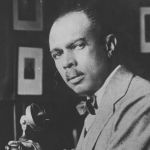Done is a battle on the dragon black,
Our champion Christ confoundit has his force;
The yetis of hell are broken with a crack,
The sign triumphal raisit is of the cross,
The devillis trymmillis with hiddous voce,
The saulis are borrowit and to the bliss can go,
Christ with his bloud our ransonis dois indoce:
Surrexit Dominus de sepulchro.
Dungan is the deidly dragon Lucifer,
The cruewall serpent with the mortal stang;
The auld kene tiger, with his teith on char,
Whilk in a wait has lyen for us so lang,
Thinking to grip us in his clawis strang;
The merciful Lord wald nocht that it were so,
He made him for to failye of that fang.
Surrexit Dominus de sepulchro.
He for our saik that sufferit to be slane,
And lyk a lamb in sacrifice was dicht,
Is lyk a lion risen up agane,
And as a gyane raxit him on hicht;
Sprungen is Aurora radious and bricht,
On loft is gone the glorious Apollo,
The blissful day departit fro the nicht:
Surrexit Dominus de sepulchro.
The grit victour again is rissen on hicht,
That for our querrell to the deth was woundit;
The sun that wox all pale now shynis bricht,
And, derkness clearit, our faith is now refoundit;
The knell of mercy fra the heaven is soundit,
The Christin are deliverit of their wo,
The Jowis and their errour are confoundit:
Surrexit Dominus de sepulchro.
The fo is chasit, the battle is done ceis,
The presone broken, the jevellouris fleit and flemit;
The weir is gon, confermit is the peis,
The fetteris lowsit and the dungeon temit,
The ransoun made, the prisoneris redeemit;
The field is won, owrecomen is the fo,
Dispuilit of the treasure that he yemit:
Surrexit Dominus de sepulchro.



















Comment form: